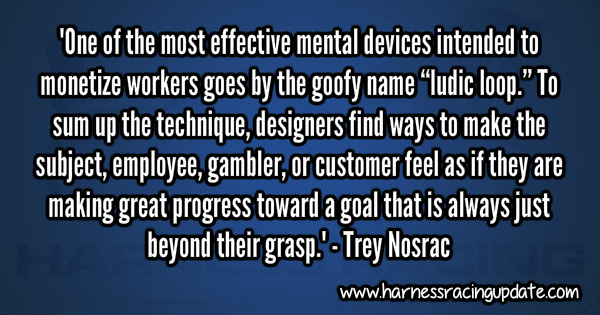Mind Games
by Trey Nosrac
Chauffeuring folks around as a free agent in the gig economy sounds exotic. However, independent contractors are under pressures both subtle and obvious. The company that takes 25 per cent of our fare is always messing with our minds, trying to trick us into working longer, working harder and dancing to the company tune. The company brain trust does not mess with our minds for our benefit; they play hardball with our emotions to increase their profit margins.
One of the most effective mental devices intended to monetize workers goes by the goofy name “ludic loop.” To sum up the technique, designers find ways to make the subject, employee, gambler, or customer feel as if they are making great progress toward a goal that is always just beyond their grasp.
In my case, the company flashes a message on the Lyft screen that looks like a graphic of a dashboard gauge with a dial tantalizingly close to, but still short of, reaching a dollar sign. Drivers know that if we reach the dollar sign, we get a reward – usually money, but additional rewards placed on the table might be coffee coupons and other trinkets. This technique is the old carrot and stick routine, but insidiously designed carrots and sticks based on algorithms and data that keep drivers on the road.
The “ludic loop” is one of the most effective video game mind-bending motivational features successfully transferred to car services drivers. It should be transferable to harness racing gamblers. These metric driven rewards stimulate the competitive juices and drive compulsive game playing. They have been the bread and butter of designing video gaming for decades. Horse racing is not video gaming, but we want players and we want them to keep playing.
One of the issues that can impede gambling on horse racing is that there is no true start or finish to a session spent wagering on racing. You win, but when do you stop? You lose, but when do you stop? The markers for success are nebulous. A horse wager is a rather lonely, unstructured affair. Unless specific targets are self-imposed, gamblers are never “on the cusp” of an explicit target that induces them to play on.
Sitting here, waiting for my next ping to spring me into action, a method where horseracing could create a primitive “ludic loop” creeps into my mind. See what you think.
A gambler logs into the Meadowlands. Let us call our gambler Leroy. He earmarks $100 for his evening of gambling. His $100 is linked to a specific wager. He can make this play on-site or off-site, but Leroy’s hundred is only good on Meadowland’s races, only today, and the only way the earmarked money total goes up or down is by wagering on this specific daily race card. The money stays with the product. Added to the mix is an element of “time” pressure, the last race on the card is the end of play and you cash out. Game over.
Let us say that after the first race Leroy builds his pile to $150. His wagering device dings and flashes.
“Congratulations Leroy! An additional $10 automatically added to your bankroll. $200 is the next plateau, keep rolling and another $25 is just around the bend. Great work!”
Leroy is having a wonderful, rare, run of luck. Or as Leroy describes it, he is a genius and his latest system is paying off. He keeps climbing. Each step of his success has found a reward. His bankroll is now $500. At this point, there will be serious dinging and flashing. His screen screams success.
“Leroy, you are now in the 9.8 per cent of players who have successfully multiplied your investment five times! Only 3.6 per cent of players are able to multiply their investment 10 times. Should you have the ability to do this, we will add $100 to your earned $1,000 and send you a voucher for $100 for a free evening of play on a future Meadowlands race program. Hope you are as excited as we are, hope you join the roster of the Meadowlands Moguls and accept a free t-shirt that tells the world, “I am a Meadowlands Mogul.”
Many psychological tricks are on the table in a wager of this sort. Leroy feels like he is in a competition, he feels that people are monitoring his progress, he does not feel alone, and he feels he is climbing toward a goal (a fluid goal). The near-miss sensation that floods endorphins and fuels slot machines comes into play. Even when he fails, he knows he was on a road to somewhere and… Dang…I have to go, duty calls. Two more customers and I get a $5 bonus and a free coffee at Starbucks.

















